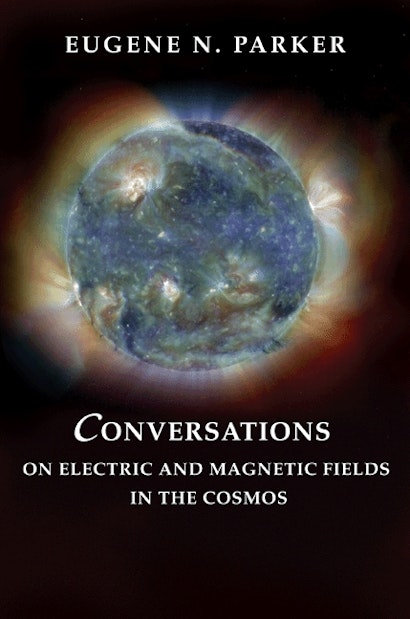Today’s standard textbooks treat the theoretical structure of electric and magnetic fields, but their emphasis is on electromagnetic radiation and static-electric and magnetic fields. In this book, Eugene Parker provides advanced graduate students and researchers with a much-needed complement to existing texts, one that discusses the dynamic electromagnetism of the cosmos—that is, the vast magnetic fields that are carried bodily in the swirling ionized gases of stars and galaxies and throughout intergalactic space.
Parker is arguably the world’s leading authority on solar wind and the effects of magnetic fields in the heliosphere, and his originality of thought and distinctive approach to physics are very much in evidence here. Seeking to enrich discussions in standard texts and correct misconceptions about the dynamics of these large-scale fields, Parker engages readers in a series of “conversations” that are at times anecdotal and even entertaining without ever sacrificing theoretical rigor. The dynamics he describes represents the Maxwell stresses of the magnetic field working against the pressure and inertia of the bulk motion of ionized gases, characterized in terms of the magnetic field and gas velocity. Parker shows how this dynamic interaction cannot be fully expressed in terms of the electric current and electric field.
Conversations on Electric and Magnetic Fields in the Cosmos goes back to basics to explain why classical hydrodynamics and magnetohydrodynamics are inescapable, even in the deepest reaches of space.
Eugene N. Parker is S. Chandrasekhar Distinguished Service Professor Emeritus of Physics and Astronomy at the University of Chicago.
"I shall strongly recommend my students to read this book in addition to their standard reading . . . not only to clarify their understanding of cosmic magnetism but also to learn how to present their ideas in a clear and understandable way."—Dimitri Sokoloff, Journal of Geophysical and Astrophysical Fluid Dynamics
"Nobody has contributed more, or more deeply, to our understanding of the physics of astrophysical magnetofluids than Eugene Parker. Conversations on Electric and Magnetic Fields in the Cosmos provides those of us who have had the privilege of learning directly from him a chance to revisit the elegant insight, structure, and breezy wit that Parker brings to the subject. For those who have not had that privilege, this book provides lasting opportunity to visit with a master."—Eugene H. Levy, Rice University
"This small book, which describes the basic physics that governs the electrodynamics of the cosmos, is graced by insights the author gleaned during a lifelong fascination with the subject matter. We owe to him the explanation of many natural phenomena including how the solar wind blows and why its magnetic field lines form Archimedian spirals. Another of his creations, the α-Ω dynamo model affords us our understanding of how the magnetic fields of planets are maintained against resistive decay and why the Sun's magnetic field reverses every eleven years."—Peter Goldreich, Institute for Advanced Study, Princeton
"This is a book by one of the leaders in the field of plasma astrophysics. Parker sets the record straight on many misunderstandings concerning electric and magnetic fields in the cosmos. The book also presents a revealing picture of the author's thinking and displays how he was able to arrive at such original solutions to so many important astrophysical problems."—Russell M. Kulsrud, author of Plasma Physics for Astrophysics
"This is a unique undertaking by a scientist who is one of the most accomplished and outstanding in our field. The book takes the reader from the elementary principles of Newtonian mechanics and Maxwell's equations to hydrodynamics and magnetohydrodynamics equations. The author has intended this book to be conversations, as the title indicates. The style is informal but the physical ideas and concepts are presented with precision."—B. C. Low, National Center for Atmospheric Research
"Parker is one of the leaders in the field and has his own novel approach to plasma astrophysics. I believe that both students and active researchers will benefit from this book."—David Spergel, Princeton University

